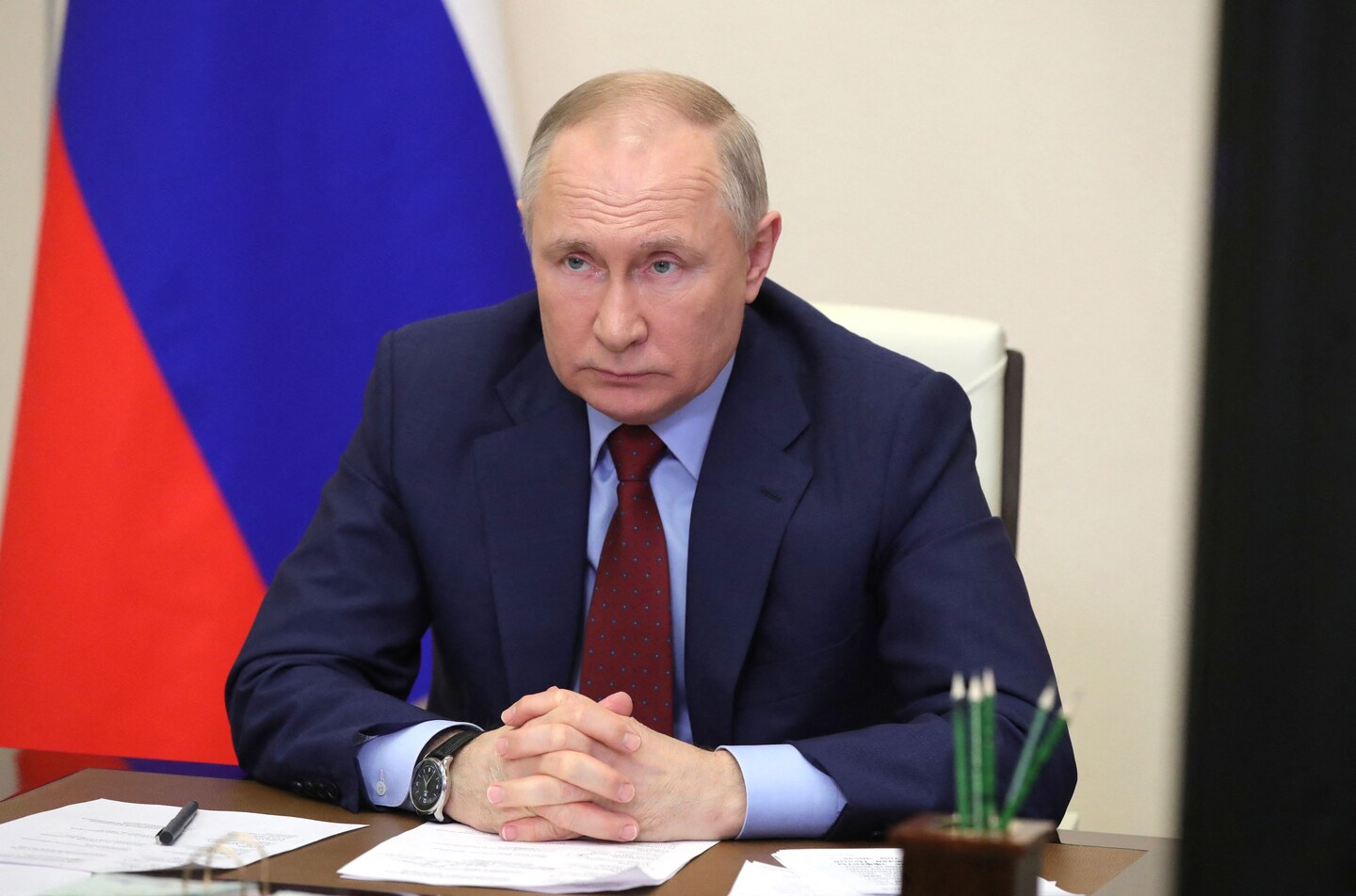Analysis | The Ukraine biolab conspiracy theory quickly went viral. It took weeks to pinpoint the source.

The Ukraine biolab conspiracy theory quickly went viral. It took weeks to pinpoint the source.
On the eve of Russia’s invasion of Ukraine, a post baselessly suggesting the Kremlin was targeting U.S.-run bioweapons labs began to gain steam on Twitter. Fact-checkers quickly identified the claim as false, but within days it went viral, eventually reaching Tucker Carlson’s prime-time show on Fox News and being amplified by the Russian government.
A pair of anonymous social media accounts were initially identified as the origin of the conspiracy theory. It wasn’t until just this week that researchers said they found the exact source.
The Anti-Defamation League (ADL) said Tuesday that a Virginia man with ties to extremist ideology QAnon was behind not only those accounts but a series of others that have amplified conspiracy theories about the war, which have come to dominate portions of the Internet.
The findings illustrate how the claim morphed into a perfect storm: the bogus post got traction on a prominent platform before its moderators stepped in, and then gained new life by hopping between sites and feeding off other conspiracy theories.
“The discovery highlights how a fringe QAnon figure, harnessing the power of social media, sparked a viral conspiracy theory that — in just a few weeks — made its way from QAnon to the world stage,” ADL wrote in a post summarizing its findings.
According to ADL’s Center on Extremism, Jacob Creech created a slew of anonymous accounts under aliases like “WarClandestine” and “BioClandestine” and posted about the theory across major platforms, including Twitter, TikTok, Reddit, Facebook and Telegeram.
Creech did not return a request for comment sent to his LinkedIn account, but on Tuesday he publicly disclosed his full name and identified himself as the source of the viral Twitter post while appearing on a broadcast for Infowars, a fringe show that dabbles in conspiracy theories. Creech later referenced appearing on the show on one of his anonymous Telegram accounts.
While many of his purported accounts have been suspended, others remain active, including a Telegram page with nearly 60,000 subscribers, where Creech continues to share conspiracy theories about the United States controlling bioweapons labs in Ukraine.
“In a lot of ways, it’s simple to return to these platforms and start up again,” Carla Hill, associate director of ADL’s Center on Extremism, said of the accounts.
The activity highlights the difficulty platforms face in enforcing policies against users seeking to avoid bans or suspensions, particularly when they operate anonymously and migrate over from other platforms, which may not be aware of their other activity elsewhere.
“You have to give it to them. They’ve tried,” Hill said of major platforms’ efforts to limit how far the biolabs conspiracy theory has spread.
Hill said the claims are particularly pernicious because they misrepresent real facts (that Ukraine has biological research facilities supported by countries including the United States) to create the illusion of something more nefarious (that the labs work on bioweapons).
“The mixture of truth, and fiction, it’s hard to separate out, and I think that is one of the biggest challenges,” she said.
As Poynter noted in a fact-check of these claims, “These labs work with a number of pathogens, including the ones that cause anthrax, plague and hemorrhagic fever in humans. They study viruses that affect birds and pigs. That does not make them bioweapon facilities.”
The bioweapons claim has become a staple of the talking points used by the Kremlin to justify Russia’s invasion of Ukraine.
“While Russia has peddled false claims about U.S. biolabs in the past, Creech’s thread helped revive a languishing Russian disinformation narrative, providing the Kremlin with another explanation to justify its invasion of Ukraine,” ADL wrote in its blog post Tuesday.
Not only did the conspiracy theory get a boost from the Russian government and prominent conservative media figures like Carlson, but it also gained a foothold among those who believe in conspiracy theories tied to QAnon and covid-19.
“As the war in Ukraine rages on, the biolab conspiracy has quickly emerged as the prevailing narrative among QAnon adherents to explain Russia’s invasion of Ukraine,” ADL wrote. “Not only does it ‘justify’ the invasion in their eyes, it also validates their belief that Covid-19 is a U.S.-created bioweapon.”
Our top tabs
Twitter is limiting the reach of Russian government accounts
Twitter will not “amplify or recommend government accounts belonging to states that limit access to free information and are engaged in armed interstate conflict,” it said. Twitter will first be applying this policy to Russian government accounts, it said.
The social media network also has a new policy for content depicting prisoners of war. The site “will now ask government or state affiliated media accounts to remove any media published that features prisoners of war (PoW) under our private information and media policy,” it said.
- It’ll also add warnings for government or state-affiliated media accounts that post content showing prisoners of war but have a “compelling public interest.”
- The site will also require tweets to be removed if they depict prisoners of war and there’s an “abusive intent” or they otherwise break the site’s rules.
Twitter and other social media platforms have come under fire for continuing to host Russian government accounts, which critics say are a key part of the Kremlin’s propaganda machine.
A new report accuses Instagram of failing to address harassment
Instagram failed to act on 90 percent of abuse sent through direct messages to five high-profile women even though the messages were reported to moderators, according to the report by the nonprofit Center for Countering Digital Hate. CCDH analyzed thousands of direct messages that the women received, Taylor Lorenz and Elizabeth Dwoskin report.
“Instagram’s direct message, or DM, function is private and operates like an email inbox,” they write. “It’s also long been a less-visible hotbed for hate, in part because of its private nature. ”
Instagram strongly rebutted the report. “While we disagree with many of the CCDH’s conclusions, we do agree that the harassment of women is unacceptable. That’s why we don’t allow gender-based hate or any threat of sexual violence, and last year we announced stronger protections for female public figures,” Meta head of women’s safety Cindy Southworth said.
Musk’s ascent to Twitter board draws mixed reactions
The prospect of Elon Musk micromanaging Twitter has sent its stock soaring, employees reeling and Republican leaders clamoring for it to take a more permissive stance on political speech, Will Oremus, Elizabeth Dwoskin, Faiz Siddiqui and Reed Albergotti report. Musk’s term on Twitter’s board will extend through 2024, according to a regulatory filing.
Employees at Twitter are anxious about how the Tesla founder and prolific tweeter could complicate their work. In an attempt to reassure her team, a senior Twitter executive said in an open letter that the work of combating “hate speech and trolls” was “bigger than any board member,” according to internal documents obtained by The Washington Post.
Twitter pushed back on the prospect that Musk, now the company’s largest shareholder, would wield outsize control. “Our Board plays an important advisory and feedback role across the entirety of our service,” spokesperson Brenden Lee said in a statement. “Our day-to-day operations and decisions are made by Twitter management and employees.” Musk did not respond to a request for comment.
Rant and rave
The Internet speculated about the role Musk could play on Twitter’s board. After Musk posted a poll asking users whether they wanted the ability to edit their posts, the company announced that it would be testing such a feature and said it “didn’t get the idea from a poll.” KTLA-TV’s Rich DeMuro:
Say what you will about Elon Musk. The guy gets things done.
— Rich DeMuro (@richontech) April 5, 2022
The Stanford Internet Observatory’s Alex Stamos:
The set of people who want an edit function is a proper subset of people who think trust and safety is easy and if techies were just more ethical/smarter (like them) then it could all be solved.
— Alex Stamos (@alexstamos) April 5, 2022
Our colleague, Taylor Lorenz:
Inside the industry
Workforce report
- The Atlantic Council hosts an event on tech diplomacy today at 10:15 a.m.
- The Center for Strategic and International Studies hosts an event on the national defense implications of commercial wireless networks on Thursday at 9:30 a.m.
- Microsoft President Brad Smith and Accenture CEO Julie Sweet speak at a Center for Strategic and International Studies event on responsible AI on Friday at 8:30 a.m.
- The American Enterprise Institute hosts an event on content moderation and Section 230 on Monday at 9:30 a.m.
Before you log off
[embedded content]
That’s all for today — thank you so much for joining us! Make sure to tell others to subscribe to The Technology202 here. Get in touch with tips, feedback or greetings on Twitter or email.


